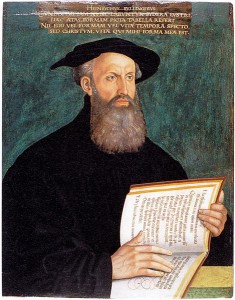On this day in Tudor history, 17th September 1575, in the reign of Queen Elizabeth I, Swiss reformer and theologian Heinrich (Henry) Bullinger died in Zurich.
Bullinger succeeded Huldrych Zwingli as pastor at Grossmünster and head of the church in Zurich. His main work was “The Decades”, a theological work, but his sermons were also translated and published, and he wrote historical works.
Here are some facts about Heinrich Bullinger:
- Reformer Heinrich Bullinger was born on 18th July 1504 at Bremgarten in Switzerland. He was the son of priest Heinrich Bullinger and Anna Wiederkehr.
- Bullinger was educated at St Martin's Latin School in Emmerich in Cleves and then the University of Cologne.
- From 1520, Bullinger was reading works by scholars such as Peter Lombard and Erasmus, church fathers such as Cyprian, Lactantius, Hilary, Athanasius, Jerome, and Augustine, and then Reformers such as Martin Luther and Philip Melancthon.
- Bullinger had planned on becoming a Carthusian monk, but by 1522, when he graduated with a Masters, had abandoned that idea.
- In 1523, he began teaching at the school at the Cistercian abbey at Kappel and it was in that year that he met reformers Leo Jud and Huldrych Zwingli. Like Luther, Zwingli believed in faith alone through Christ alone as the path to salvation, and also believed in the sole authority of the Bible.
- In 1527, Bullinger met and married former nun Anna Adlischweiler. The couple went on to have eleven children together and also adopted orphans. The couple also welcomed religious refugees into their home.
- In 1528, Bullinger accompanied Zwingli to the Bern Disputation, a debate over the theology of the Swiss Reformation.
- In 1529, Bullinger returned home to Bremgarten to take his father's place as parish priest there.
- In 1531, Zwingli was killed in battle during the Kappel Wars between Catholics and Protestants. Bullinger was appointed pastor at the Grossmünster, or Great Church, in Zurich in Zwingli's place. Bullinger brought peace and stability back to Zurich, avoiding political preaching and focusing his preaching on how his congregation could apply scripture to their lives.
- WorldHistory.org explains Bullinger's theology, which he explored in his work "The Decades": "One of the most important concepts for the later development of Protestant Christianity was Bullinger's covenant theology which claimed God had offered an agreement to humanity which Christians were obligated to honor through obedience to the divine will. Covenant theology defined the human relationship with the divine as a compact – a covenant – whereby the one party provided something of value – the grace of salvation – in return for acknowledgment through grateful devotion and works manifesting that gratitude. There was nothing one could do to earn salvation – it was God's free gift one only had to accept – but one was expected to reflect that gift in one's life through one's works."
- Bullinger's "The Decades" was a compilation of sermons which covered topics such as the authority of scripture, predestination, the nature of the divine, and God's grace. It was translated from Latin to English in several editions.
- In 1536, Bullinger helped compose The First Helvetic Confession, which aimed to bring about church unity by overcoming the schisms caused by different views on The Lord's Supper. In 1562, he wrote The Second Helvetic Confession, which was published in 1566. The Encyclopedia Britannica describes this confession as "a lengthy theological statement of 30 articles" which discussed topics such as the Trinity, Christology, scripture as the sole authority, providence, and predestination. It became the official creed of the Swiss cantons.
- Bullinger's other works included a history of Zurich, a history of the Reformation, and a life of Zwingli. He was also a prolific letter writer, corresponding with other reformers, and also rulers such as the Lutheran Princes, Edward VI and Elizabeth I.
- He died on this day in 1575. WorldHistory.org concludes that "His efforts would allow Calvin to develop a systematic theology, addressing points that divided Lutheran and Reformed faiths... he was regarded as the foremost thinker and writer of the Reformation, whose works were more widely read and far more influential than those of the major figures of the Protestant Reformation."
Also on this day in Tudor history...
Notes and Sources
- Mark, Joshua J. "Heinrich Bullinger", World History Encylopedia, https://www.worldhistory.org/Heinrich_Bullinger/.
- "Heinrich Bullinger", Britannica, https://www.britannica.com/biography/Heinrich-Bullinger
Image: A portrait of Heinrich Bullinger by Hans Asper.




Leave a Reply